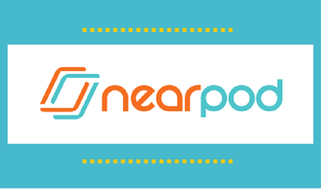We all believe in our students and their capabilities. We all believe in their ability to succeed and thrive in our classes. But no matter what we believe, if we’re honest with ourselves, there will be times that we fail to reach all of our students. And this really shouldn’t be a surprise. Each person that is created has a supremely unique set of skills, talents, abilities, learning strengths and weaknesses. One of our goals as educators is to do our duty to reach each of our students and play to their strengths while encouraging improvement of their weaknesses.
That’s where Nearpod comes in. Nearpod is an incredible free presentation app that can enhance the learning and engagement in your classroom. Nearpod allows you to have a completely engaging, exciting and interactive lesson which is paced by the teacher who controls the students iPads.
Here are my top 3 reasons I LOVE Nearpod:
1. 100% engagement
We’ve all been there. We ask questions in class and the same handful of kids raise their hands to participate while others shy away. Sometimes they do not know the answer, sometimes they’re daydreaming, and other times they’re scared to answer in public and face the potential embarrassment of being incorrect.
Nearpod enables your entire (yes, ENTIRE!) class to be fully engaged in your lesson.
Skeptical?
Try it. I dare you. Aside from being fun, every kid has equal opportunities to learn, answer questions, take part in polls, submit visual drawings, and more, and all anonymously. I can’t tell you how many times after finishing a Nearpod session, both the quietest and the most rambunctious kids in class beg to find out the next time we can learn and review with Nearpod. It’s an amazing sight to see.
2. It’s YOUR classroom on steroids
I’m a big believer in using tech in the classroom when it aids and enhances the learning. Using tech just because it’s “cool” or “fun” just doesn’t cut it. Nearpod definitely passes the test. I describe it as a classroom on steroids. It brings out the best in our students and their abilities. It creates a dynamic, 100% engaging atmosphere, while not changing YOUR curriculum and amazing material. That being said, as in (nearly?) everything in life, it is best in moderation.
A class that usesNearpod every day to learn, will fail. As you get more comfortable with it, you can pick and choose where you see it fits best. Personally, I see the most value in holdingNearpod review sessions to reinforce past lessons.
3. Boosts self-esteem
This past year, I had a student in 7th grade who was extremely shy and insecure about himself. He happened to be a pretty decent student, but he was petrified to speak in class and participate, in fear of embarrassing himself. Then, Nearpod happened. I truly feel the use of Nearpod changed him. All of a sudden he had a safe place to participate without any of his fears. He changed from a student that never participated to an active participant with and without Nearpod.
Let me explain.
The way Nearpod works is that when students submit their answers to the teacher, the teacher has the ability to share the students’ answers back anonymously. Students who are less confident in themselves all of a sudden come to life. In fact, when their answer is shared correctly, they vocally take pride in it and the class cheers them on. The more positive experiences that occur, the more the students get comfortable with sharing during class. It creates a beautiful learning environment to be a part of.
There is so much more to talk about Nearpod. Perhaps in another post I will share some of the other great things such as: aggregated data, Nearpod homework, reaching different learning styles, and more! But for now, if you haven’t tried Nearpod, what are you waiting for?
For more info see nearpod.com or check out these videos below:
Rabbi Zach Swigard teaches 6th, 7th, and 8th grade students at Harkham Hillel Hebrew Academy and is the administrative director for BILU, both in Beverly Hills, California. Rabbi Swigard also teaches a college level, Touro accredited class at BILU titled, “Modern Jewish Questions”.





















